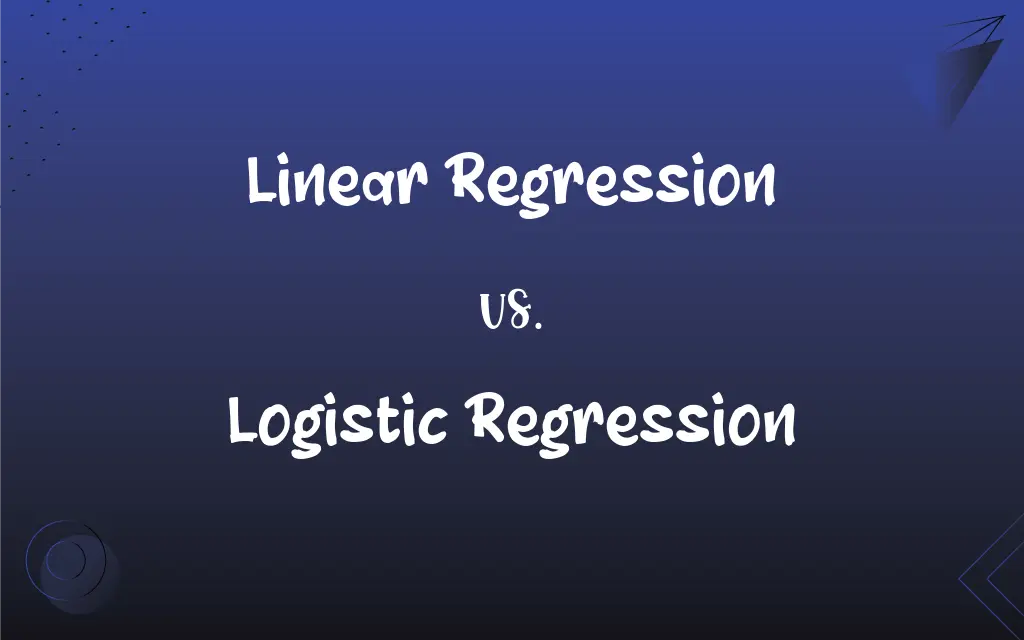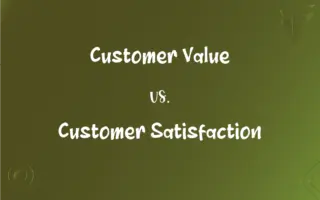Linear Regression vs. Logistic Regression: What's the Difference?
Edited by Aimie Carlson || By Janet White || Published on February 18, 2024
Linear regression predicts continuous outcomes with a straight line relationship, while logistic regression predicts binary outcomes using a logistic curve.

Key Differences
Linear regression is a statistical method used to model the relationship between a dependent variable and one or more independent variables by fitting a linear equation to observed data. The core idea is to obtain a line that best fits the data. Logistic regression, however, is used when the dependent variable is categorical, typically for binary classification tasks. It models the probability of a binary outcome based on one or more predictor variables.
In linear regression, the outcome is continuous and is not limited to a particular range, meaning it can predict values across a wide spectrum. For example, predicting house prices based on size and location. On the contrary, logistic regression deals with probability estimates between 0 and 1, making it suitable for scenarios like predicting whether an email is spam or not.
The linear regression model assumes a linear relationship between the input and output variables. This implies that a change in an independent variable will result in a proportional change in the dependent variable. Logistic regression, in contrast, assumes a logistic function; the change in the independent variable will not produce a straightforward change in the dependent variable, but rather a change in the probability of a given outcome.
Linear regression is sensitive to outliers in the data, as they can significantly affect the line of best fit. It’s often used for forecasting and finding out the effect of one variable on another. Logistic regression is less sensitive to small numbers of outliers and is primarily used for classification purposes, predicting the probability of occurrence of an event by fitting data to a logistic curve.
Linear regression can be used to determine the strength of predictors and their relationship with the outcome variable. It is commonly used in fields like economics and social sciences. Logistic regression, however, is more about classification and is used extensively in fields like medicine and machine learning for binary classification problems.
ADVERTISEMENT
Comparison Chart
Outcome Type
Predicts continuous variables.
Predicts binary or categorical outcomes.
Relationship
Models a linear relationship between variables.
Models a logistic (S-shaped) relationship.
Range of Predictions
Predicts values across a wide spectrum.
Predicts probabilities between 0 and 1.
Sensitivity to Outliers
More sensitive to outliers.
Less sensitive to outliers.
Primary Use
Used for prediction and forecasting.
Used for classification and probability estimation.
ADVERTISEMENT
Linear Regression and Logistic Regression Definitions
Linear Regression
Linear regression identifies the strength and direction of the relationship between variables.
Linear regression analysis revealed a strong positive correlation between education and income level.
Logistic Regression
Logistic regression deals with categorical dependent variables using a logistic function.
The logistic regression model predicted the success or failure of a marketing campaign.
Linear Regression
Linear regression fits the best straight line through data points to model relationships.
The linear regression model showed a direct relationship between hours studied and exam scores.
Logistic Regression
Logistic regression is suitable for scenarios where linear regression cannot be applied due to binary outcomes.
We applied logistic regression for the binary decision of loan approval based on credit history.
Linear Regression
Linear regression can be used to estimate the effects of changes in independent variables on a dependent variable.
The linear regression model estimated the impact of price changes on product demand.
Logistic Regression
Logistic regression is used for binary classification problems in various fields.
Using logistic regression, we classified emails as either 'spam' or 'not spam'.
Linear Regression
Linear regression models the linear relationship between a dependent variable and one or more independent variables.
Using linear regression, we predicted the increase in sales based on advertising spend.
Logistic Regression
Logistic regression models the probability of a binary outcome based on independent variables.
Logistic regression was used to predict the likelihood of a customer buying a product.
Linear Regression
Linear regression is used for forecasting continuous outcomes based on historical data.
Linear regression forecasted next year's temperatures based on past climate patterns.
Logistic Regression
Logistic regression outputs probabilities, which are converted to binary values for classification.
Logistic regression calculated the probability of patients having a disease, classifying them accordingly.
FAQs
When is logistic regression used?
Logistic regression is used for binary classification problems where the outcome is categorical (e.g., yes/no, true/false).
Can linear regression predict probabilities?
Linear regression is not suitable for predicting probabilities as it can predict values outside the 0-1 range.
What is logistic regression?
Logistic regression is a statistical method for analyzing a dataset in which there are one or more independent variables that determine an outcome, which is categorical.
Is logistic regression affected by outliers?
Logistic regression is generally more robust to outliers compared to linear regression.
What is linear regression?
Linear regression is a statistical technique for modeling the relationship between a dependent variable and one or more independent variables using a linear approach.
When is linear regression used?
Linear regression is used when the dependent variable is continuous and the relationship with independent variables is linear.
Is linear regression suitable for time series data?
Linear regression can be used for time series data but requires checking for autocorrelation.
What kind of relationship does logistic regression model?
Logistic regression models a logistic (S-shaped) curve, not a straight line.
How does linear regression handle outliers?
Linear regression is sensitive to outliers, which can significantly influence the line of best fit.
What are the assumptions of linear regression?
Linear regression assumes linearity, homoscedasticity, independence, and normality in the residuals.
Can the coefficients in logistic regression be interpreted the same way as in linear regression?
No, the coefficients in logistic regression represent the change in the log odds of the outcome per unit change in the predictor, unlike the direct impact in linear regression.
How do logistic regression outcomes differ from linear regression?
Logistic regression outcomes are discrete and binary, whereas linear regression outcomes are continuous.
How is the goodness of fit measured in logistic regression?
In logistic regression, goodness of fit can be assessed using metrics like the ROC curve or confusion matrix.
Can linear regression handle multiple independent variables?
Yes, linear regression can be extended to multiple independent variables, known as multiple linear regression.
What is a major limitation of logistic regression?
Logistic regression can struggle with complex relationships that go beyond a simple binary outcome.
Can linear regression be used for classification?
Linear regression is generally not suitable for classification due to its continuous nature.
What are the assumptions of logistic regression?
Logistic regression assumes a binomial distribution of the dependent variable and no multicollinearity among predictors.
How is the goodness of fit measured in linear regression?
In linear regression, goodness of fit is often measured using R-squared.
What is a major limitation of linear regression?
A major limitation of linear regression is its inability to handle non-linear relationships effectively.
Can logistic regression handle multiple predictors?
Yes, logistic regression can use multiple predictors and is then called multiple logistic regression.
About Author
Written by
Janet WhiteJanet White has been an esteemed writer and blogger for Difference Wiki. Holding a Master's degree in Science and Medical Journalism from the prestigious Boston University, she has consistently demonstrated her expertise and passion for her field. When she's not immersed in her work, Janet relishes her time exercising, delving into a good book, and cherishing moments with friends and family.
Edited by
Aimie CarlsonAimie Carlson, holding a master's degree in English literature, is a fervent English language enthusiast. She lends her writing talents to Difference Wiki, a prominent website that specializes in comparisons, offering readers insightful analyses that both captivate and inform.






































































